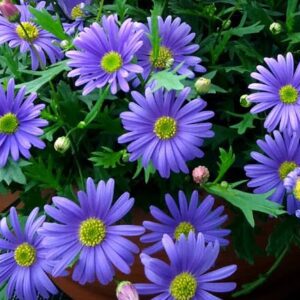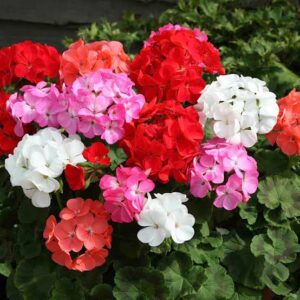Gerbera Autumn Beauty Scientific Name : Gerbera jamesonii
Common Name : African Daisy
Hardiness Zone : 9a – 10b
Blooming Season : Spring, Late Spring, Summer, Autumn, Winter, Late Summer, Early Spring
Plant Habit : Upright
Spacing : 12 – 14″ (30 – 36cm)
Height : 6 – 10″ (15 – 25cm)
Width : 12 – 14″ (30 – 36cm)
Exposure : Partial Sun
Grower Information :
Seed supplied as: Coated.
Plug crop time: 6 to 7 weeks
Transplant to finish: 8 to 10 weeks
- Produces manageable, larger-sized plants with very large flowers – beats competing series for colour range, bloom size and seed quality.
- Ideal for larger container programs.
- Supplied with industry-leading seed quality.
Uniform mix of bold, bright colours
How to Plant and Grow Gerbera Daisy Seeds
Step #1: Prepare Trays: Fill trays or pots with a light seed starting medium, or make your own mix using peat moss, perlite, and vermiculite. Dampen the medium with water.
Step #2: Plant Seeds: Use a toothpick to poke a hole in the planting medium. Plant the Gerbera daisy seeds with the seed end pointing down, and the little brush part just barely at the top of the soil.
Step #3: Grow Seeds: Keep the seeds moist, but not waterlogged, and above 70° F, with eight hours or more of bright light per day. The easiest way to do this is to cover the trays with a clear plastic tent and place them indoors in a bright window or under grow lights. When the Gerbera daisy seeds germinate in two to three weeks, remove the plastic cover but keep the seedlings moist.
Step #4: Transplant Seedlings: After the Gerbera daisy seedlings have developed two sets of true leaves, you can carefully transplant the plants to larger pots.
Step #5: Harden Plants: When it’s consistently warm outside, and the Gerbera daisy plants are hardy and growing, move the pots outdoors to a protected spot for a few days to get the young plants used to the breezes and temperature shifts found outside.
Step #6: Enjoy Flowers: At this point, you can leave the daisies in their pots or plant them in the yard. Locate the plants in a spot with plenty of morning sun and a little afternoon shade to keep them from wilting. Feed the plants regularly with a balanced organic fertilizer, and keep them watered but not soggy.








Reviews
There are no reviews yet.